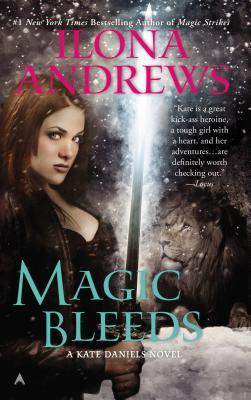Review: Ilona Andrews’s “Magic Bleeds”
by Miles Raymer

Better and better. I continue to be impressed with the deliberate and patient fashion in which Ilona Andrews lays out the story of Kate Daniels, an eminently-lovable lady who I’m quickly coming to see as my generation’s Harry Potter for adults. Magic Bleeds is my favorite book of the series so far, and contains several notable transitions for this narrative and its characters.
Magic Bleeds starts off much like its predecessors, but ends in a very different place than I’ve come to expect. It takes a while to get all the details, but we eventually encounter the most compelling villain of the series thus far––one who occupies a special place in Kate’s personal history. This dynamic renders the central conflict in Magic Bleeds more consequential and more dramatic than in previous installments, which is a welcome development; up to this point, Andrews’s talents as a storyteller have been invested almost entirely in building up Kate and her loved ones, with the bad guys taking a back seat. This time around, we get a more variegated and sinister monster who not only wreaks havoc with appropriate profligacy, but who also provides a dark mirror that forces Kate to confront the less savory aspects of her own identity.
There are other ways in which Andrews begins to transform this story into something beyond its initial trappings. The police-procedural element doesn’t seem to be going anywhere, but Andrews layers on a much grander family narrative that will clearly fuel the series moving forward. It’s a paradigmatic biological vs. logical family situation, with Kate doing everything in her power to choose and protect her logical family, even as her biological one, which is “full of overpowered assholes,” threatens everything she is trying to build (319). As in all stories where the main character is targeted by overpowering evil, strong interpersonal ties generate fortitude and liability in equal measure. Happily, this guarantees that Kate will continue to defend her people by busting sweet ninja moves, chopping things up with her trusty saber, and demolishing tough enemies with bitchin’ power words, which never gets old.
Unsurprisingly, Curran is the catalyst for Kate’s transition from badass loner to courageous leader. Their relationship changes more rapidly in this book than in the previous three combined, and Andrews doesn’t fail to deliver when bringing the sexual tension between these two to a roaring climax. Even more interesting, however, is the aftermath of Kate and Curran’s coming together as a romantic entity. Both have extreme baggage, and neither is willing to abandon personal obligations for a fling. The result is that they have to learn to act like adults, which is a huge relief for any reader rooting for intelligent behavior to triumph over the asinine tropes commonly found in books with covers like the one at the top of this page. They definitely have their immature and petty moments, but all in all, Kate and Curran are willing to grow, and to grow together. It’s a great starting point for whatever comes next.
The end of this book left me feeling really good, so I hope for drama’s sake there’s something nasty on the horizon. Some Game of Thrones-style brutality would really shake things up at this point, and also set the stage for the latter half of the series.
Rating: 9/10
[…] get a closer look at Hugh d’Ambray, Kate’s arch enemy’s most trusted servant. As I learned with Book 4, the difference between a “good” and “great” Kate Daniels book usually […]